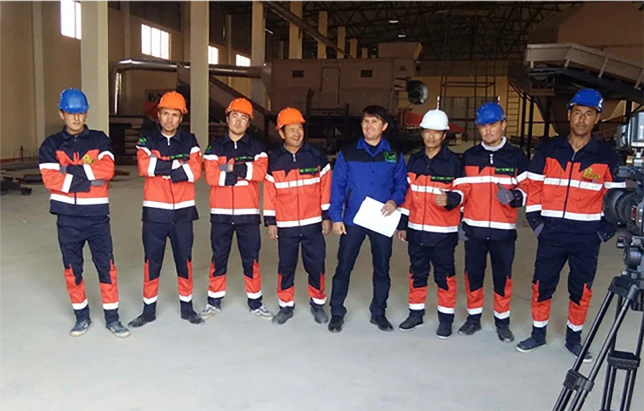

ಆಕ್ಟೋ . 22, 2024 04:51 Back to list
The Role of Hammer Crushers in Cement Plants
Cement production is a complex process that requires the precise combination of various raw materials, including limestone, clay, and gypsum. Among the many types of machinery utilized in this process, the hammer crusher plays a pivotal role. This article explores the significance of hammer crushers in cement plants, their operational mechanisms, and their contributions to the overall efficiency of cement production.
The Basics of Hammer Crushers
A hammer crusher is a type of impact crusher that uses a rotating hammer to crush materials. The design of the hammer crusher involves a high-speed rotor with several hammers attached to it. As the rotor spins, the hammers strike the feed material, breaking it apart. This mechanism allows for the efficient crushing of large pieces of raw materials, making it an essential equipment in cement manufacturing.
Importance in Raw Material Preparation
In cement plants, the initial raw materials often come in large rock forms that are too big for further processing. The hammer crusher is tasked with reducing these large boulders into smaller sizes suitable for subsequent operations, such as grinding. Typically, the hammer crusher can handle the primary crushing of materials such as limestone, dolomite, and clay. By reducing these materials into sizes ranging from 50 to 100 millimeters, the hammer crusher prepares them for the milling process, where they will be further refined into fine powder.
Operational Efficiency

One of the key advantages of using a hammer crusher in a cement plant is its operational efficiency. Due to its ability to process large quantities of materials quickly, a hammer crusher enhances the throughput of the production line. This efficiency results in cost savings, as less energy is required to crush raw materials compared to other crushing technologies. The simple structure of hammer crushers also means that they require less maintenance and downtime, further contributing to their efficiency.
Versatile Material Handling
Another significant aspect of hammer crushers is their versatility. These machines can crush a variety of materials, which is essential in cement production where multiple types of raw inputs are used. Whether it is limestone, sandstone, or recycled materials, hammer crushers can accommodate different feed sizes and can be easily adjusted to meet specific process needs.
Environmental Considerations
As the cement industry faces increasing scrutiny regarding its environmental impact, hammer crushers can play a role in improving sustainability. The use of hammer crushers can facilitate the recycling of industrial by-products, such as fly ash or slag, which can be used in cement production. By incorporating recycled materials, plants can reduce waste generation and lower their carbon footprint, aligning with global trends towards more sustainable practices.
Conclusion
In conclusion, hammer crushers are indispensable machines in cement plants, significantly contributing to the efficiency and effectiveness of the cement production process. By enabling the rapid and versatile crushing of raw materials, these machines ensure that the production line operates smoothly, all while allowing for greater sustainability through the incorporation of recycled materials. As the industry continues to evolve, the role of hammer crushers in cement manufacturing will undoubtedly remain critical, offering solutions to both operational challenges and environmental concerns.
Latest news
Troubleshooting Common Eddy Separator Problems
NewsJul.04,2025
The Role of Metal Recycling Plants in Circular Economy
NewsJul.04,2025
The Impact of Recycling Line Pickers on Waste Management Costs
NewsJul.04,2025
Safety Features Every Metal Shredder Should Have
NewsJul.04,2025
How Industrial Shredders Improve Waste Management Systems
NewsJul.04,2025
How Cable Granulators Contribute to Sustainable Recycling
NewsJul.04,2025